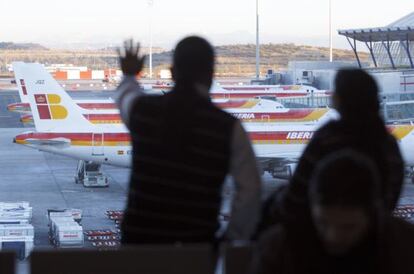“Big brother” Washington decides whether you can board your flight
Consumer organizations question whether a recent US-EU treaty that allows for passenger pre-screening violates personal data protection laws

Last May, Hernando Calvo Ospina, a Colombian journalist who has lived in Paris for the past 25 years, was left stranded at Madrid’s Barajas International Airport, unable to travel to Cuba because an official from the US embassy had prevented him from doing so. “He asked me for my passport and told me that I couldn’t get on board the flight because the aircraft was going to cross US airspace for a few minutes,” explains Calvo Ospina, who is a contributor for Le Monde Diplomatique. “He told me that I was on a list of people who may launch an attack against the United States. I made this same trip last October and nothing happened then.”
In December, the United States and the European Commission signed an agreement, which was approved by the European Parliament in April, which makes it mandatory for all airlines to give to the US Department of Homeland Security information on all passengers arriving to and departing from the United States. But the agreement, known as the Passenger Name Record (PNR), only applies to inbound and outbound US flights; it wasn’t applicable in Calvo Ospina’s case.
But since March, US authorities have been demanding that all European carriers turn over the name, date of birth and gender of each passenger before takeoff. The program is known as Secure Flight Over-flight and is administered by the Transportation Security Administration (TSA), a Homeland Security agency. The TSA maintains “No Fly” and “Automatic Selectee” watchlists.
In demanding the records, US officials argue that some passengers may be on these US “blacklists” of people who are thought to be terrorists planning to hijack a plane. Airlines are obliged to provide all information concerning passengers to US authorities and if they don’t, they cannot enter US airspace. US security officials also have the authority to keep any passenger from boarding the plane.
The passenger pre-screening program, which was signed between the United States and the Spanish Interior Ministry in 2009, is controversial. Not only do US officials have personal data registered, but they can also determine how many times a person has traveled to Cuba.
US citizens, for the most part, are restricted from traveling to Cuba without a special license from the US Treasury Department. Washington also warns US citizens from traveling to North Korea and Iran.
It is difficult to determine how many people in Spain have been affected by this US policy. In Spain thousands of passengers who have traveled to Cuba, Canada and Mexico have all been screened. Compounding this problem, carriers such as Air Europa, Iberia and Aeroméxico don’t regularly inform passengers that their personal data will be turned over to Washington. Only the Canadian carrier Air Transat informs passengers; Air Europa and Aeroméxico said they will begin doing so shortly.
“The lack of information is a clear violation of the personal data protection law,” says Rubén Sánchez of the Facua consumers association.
“Anyone who turns over personal data must inform the person who is affected. This entire program is an unfair US measure.”
The Consumers and Buyers Organization (OCU) also agrees.
In May, lawmakers from the United Left (IU) coalition questioned the Popular Party (PP) government over whether passenger pre-screening was legal. The government informed the IU that it was protected under a broader US-EU treaty that set up the PNR program.
However, flights that cross into US airspace, without landing at a US airport, are not included.
According to the treaty’s second article, pre-screening will only be conducted in “airline carriers that operate passenger flights to and from the European Union and the United States.” A spokesman for the European Commission has also confirmed that the treaty does not include flights that just cross US airspace.
The Spanish Agency for the Protection of Personal Data says it is “very concerned” about this practice. “What guarantees exist that this information will be kept confidential?” asked a spokesman for the agency.
Even the airlines are in doubt over whether they have the legal duty to inform Washington about their passengers if they cross US airspace.
Iberia said that it only does so on flights to Mexico, but not on the Madrid-Havana route. But Air Europa says it turns over pre-screening information on all its flights to avoid facing fines.
Meanwhile, Hernando Calvo was unable to board his flight to Havana — the ticket had cost him 744 euros. He asked Air Europa to reimburse him but the carrier told him that it was his responsibility to have all documents in order and be ready to answer to all air authorities. Calvo responded by saying that he did indeed have all the documents he needed in order: his passport.
Tu suscripción se está usando en otro dispositivo
¿Quieres añadir otro usuario a tu suscripción?
Si continúas leyendo en este dispositivo, no se podrá leer en el otro.
FlechaTu suscripción se está usando en otro dispositivo y solo puedes acceder a EL PAÍS desde un dispositivo a la vez.
Si quieres compartir tu cuenta, cambia tu suscripción a la modalidad Premium, así podrás añadir otro usuario. Cada uno accederá con su propia cuenta de email, lo que os permitirá personalizar vuestra experiencia en EL PAÍS.
¿Tienes una suscripción de empresa? Accede aquí para contratar más cuentas.
En el caso de no saber quién está usando tu cuenta, te recomendamos cambiar tu contraseña aquí.
Si decides continuar compartiendo tu cuenta, este mensaje se mostrará en tu dispositivo y en el de la otra persona que está usando tu cuenta de forma indefinida, afectando a tu experiencia de lectura. Puedes consultar aquí los términos y condiciones de la suscripción digital.








































